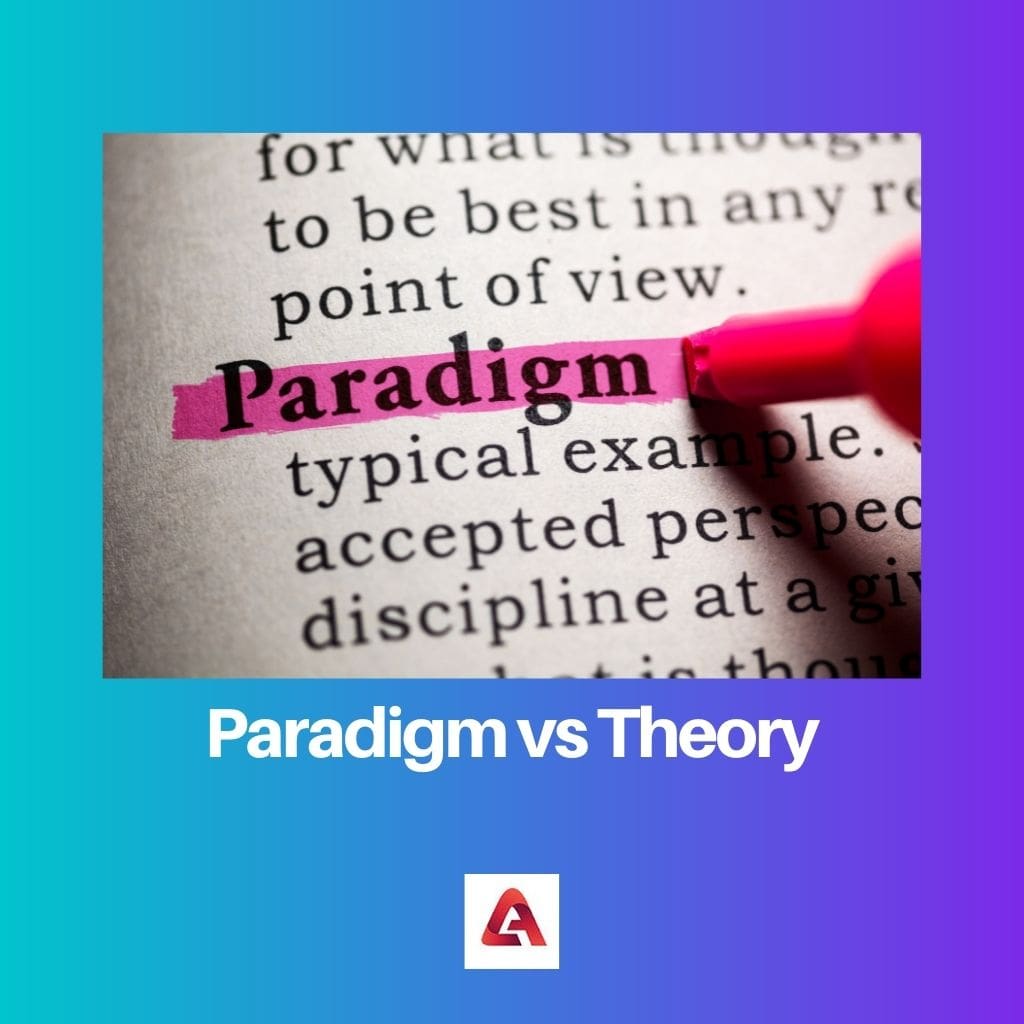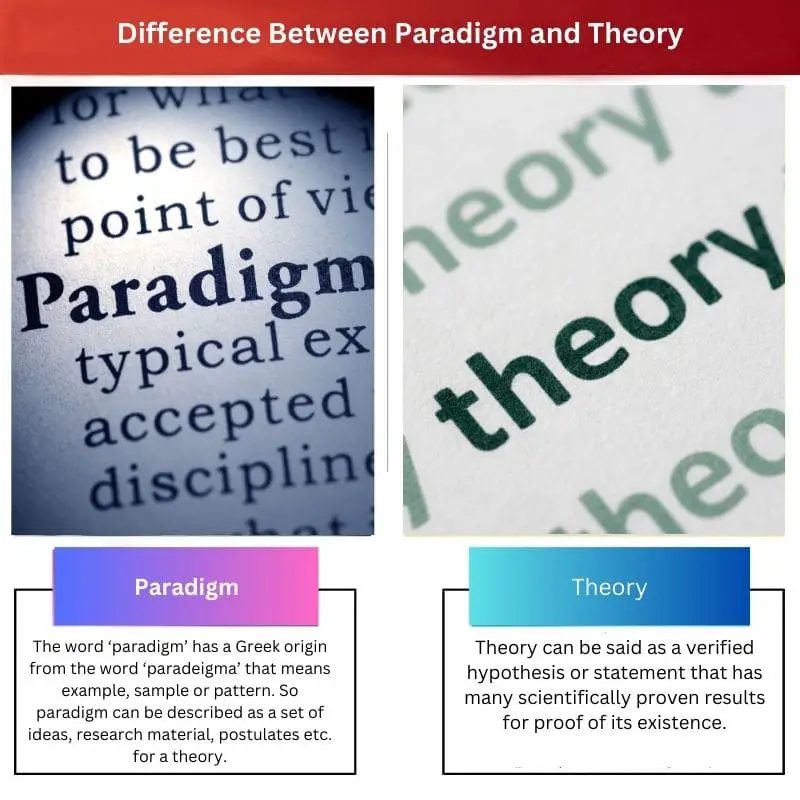Science is a large field and has various terms and ideologies being incorporated, not only into their facts and explanations but also into our daily life. Two such terms are paradigm and theory.
Paradigm and theory are two interdependent terms. Like in the case of analyzing and evaluating, one must have a paradigm before writing a theory.
Key Takeaways
- A paradigm refers to a broad framework or set of assumptions that shape a particular field or discipline, including its methods, theories, and practices; theory is a specific, testable explanation for a phenomenon within that field.
- Paradigm provides a general perspective or approach, while theory offers a more detailed explanation of specific phenomena.
- Paradigm may change as discoveries and approaches emerge, while the theory may be revised or replaced as new evidence is uncovered or tested.
Paradigm vs. Theory
A paradigm is a set of fundamental assumptions and concepts that provide a framework for understanding and interpreting a particular field of study. A theory is a well-established explanation for a particular phenomenon based on empirical evidence, and it is used to make predictions about future observations or events.

The paradigm is the reference point for a theory. It is a framework or structure that embodies a lot of theories with a generic explanation for the intellectually disciplined crowd.
The theory is a verified hypothesis with various scientifically proven results for support.
Comparison Table
| Parameters of Comparison | Paradigm | Theory |
|---|---|---|
| Meaning | The reference point for the theory | Verified hypothesis |
| Considered to be | Framework for reference | Creation of new knowledge |
| Uses | Showing a perspective of reality and explanation to the people | For predicting natural phenomena or explaining an existing phenomenon |
| Change | Works as an embodiment of theories so not as accurate as theory. | Can be tested and falsified |
| Content | Experimental or research theories | Scientifically proven results |
| Nature | Philosophical in nature | Ideological in nature |
| Approach | Has a more general approach | Specific to the topic |
What is Paradigm?
The word ‘paradigm’ has a Greek origin from the word ‘paradeigma’, which means example, sample, or pattern. So paradigm can be described as a set of ideas, research material, postulates, etc., for a theory.
Paradigm is philosophical and has a general approach since it has no proof of existence.
A paradigm can be considered to be in a philosophical as well as scientific sense. It shows the reality from different perspectives for the intellectually disciplined crowd. This provides a sense of understanding of various aspects of nature.
In science, we have absolute truth, and during such cases, two paradigms cannot stand together, and this phenomenon is called a paradigm shift.

What is Theory?
A theory is a verified hypothesis or statement with many scientifically proven results to prove its existence.
It is ideological and also has a more specific approach. Unlike a paradigm, a theory can be proven wrong since it is more specific.
Theories can also be classified according to the field they are being used in, but the most known type is the scientific theory. This includes all the statements, hypotheses, and postulates proven from the paradigm.
Scientifically, it is said to be statements or explanations of a recurring phenomenon that has been proved repeatedly through scientific calculations, research, and hypothesis.

Main Differences Between Paradigm and Theory
- The paradigm means a reference point to develop a theory, whereas the theory is considered a verified hypothesis. It is a defined statement to prove a hypothesis.
- A paradigm cannot be given as a statement but only as a framework of reference for developing a theory. A theory creates new knowledge, as each theory gives a different ideology.

Last Updated : 11 June, 2023


Emma Smith holds an MA degree in English from Irvine Valley College. She has been a Journalist since 2002, writing articles on the English language, Sports, and Law. Read more about me on her bio page.

The comprehensive analysis of paradigm and theory is a testament to the article’s intellectual rigor. An engaging and informative read for those intrigued by scientific concepts.
The distinction between paradigm and theory is effectively communicated in a thoughtful manner. This serves as an engaging piece for intellectual discussions.
The clarity and organization of the content are commendable. It’s a valuable read for those seeking to grasp the fundamental concepts of science.
Absolutely. This article could serve as a guiding light for students exploring the nuances of scientific theories and paradigms.
The article provides a comprehensive overview of the relationship between paradigm and theory in the field of science. It is refreshing to see clarity and precision in defining these terms.
I wholeheartedly agree. The article is an excellent resource for anyone looking to deepen their understanding of scientific methodology.
The concise comparison between paradigm and theory enriches the understanding of these concepts. A well-articulated content piece.
Indeed. The distinguished nature of paradigm and theory is effectively communicated, making it an enlightening read.
The article’s delivery of complex scientific concepts in a clear and understandable manner is commendable. A valuable resource for those delving into scientific inquiries.
I appreciate the meticulous approach in elucidating the differences between paradigm and theory. The detail-oriented nature of the content is impressive.
The article effectively presents paradigm and theory as indispensable elements of scientific discourse. A thorough and insightful exploration.